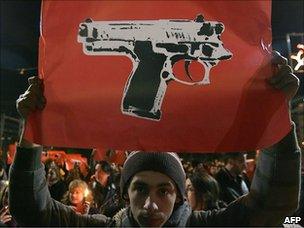Relief but lingering anger over Greece police verdict
- Published

Alexandros death exacerbated young people's distrust of the Greek police
The decision to convict Special Guard Epaminondas Korkoneas of murder closes one of the darkest chapters of recent Greek history and is a source of considerable relief for the country's socialist government.
Anything other than a guilty verdict could have triggered a violent response from the country's youth, many of whom regard the police with suspicion, mistrust and outright hatred.
The outcome is a source of grim satisfaction for the family of 15-year-old Alexandros Grigoropoulos, who had fully expected the "Rambo of Exarchia" to be convicted of murder.
Alexandros' mother, Gina Tsalikian, who runs a jewellery store in Athens, was highly distressed by attempts by Korkoneas' defence team to paint her son as a trouble maker and the verdict helps to restore his memory.
"Justice has been done," a spokesman for Ms Tsalikian told the BBC.
"Of course, Alexandros is not coming back, but at least what is important for the family is that his good name has been restored."
Lingering anger
The conviction was also welcomed by Manos Koufouglou, who chairs the residents association of Exarchia, the rebellious Bohemian district of central Athens where the killing took place and where there are frequent clashes with riot police.
But Mr Koufouglou said that while tensions had eased, the people of Exarchia remained unhappy that the armed Special Guard unit to which Korkoneas belonged had not been disbanded.
"Police violence goes on," he told me. "The government has not done enough to reform the police."
"There will be a demonstration to mark the anniversary of the murder. We will not forget."
Nearly two years after the murder, the chant "Cops, Pigs, Murderers!" frequently echoes around the streets of Athens during demonstrations to protest against the government's austerity measures aimed at tackling the financial crisis.
Although the administration of George Papandreou - which, last week marked a year in office - has been preoccupied with the economy, it has made strenuous efforts to address the issue of law and order, especially while the Ministry of Citizens' Protection was led by Michalis Chryssohoidis.
Before being promoted to Minister of Economy, Mr Chryssohoidis promised to restore public confidence in the police, to eradicate brutality and to raise training standards to match those elsewhere in Europe.
He pledged to prevent a repeat of the 2008 riots when there was a perception that the police had stood aside and tolerated the torching of shops and banks in city centres across the country.
Although Athens and other cities have been affected by big demonstrations since the financial meltdown, the destruction has not been on the same scale as the "December Uprising".
In order to regain control of the streets, Mr Chryssohoidis introduced a new rapid reaction force, who patrol the city centres in groups of four on motor-bikes with their blue lights flashing.
Bleak future
Christos Fotopoulos, the head of the Greek police union told the BBC: "The new measures and increased police presence have definitely improved things. But crime is on the increase and we're still having to chase the criminals."
Mr Fotopoulos declined to comment on the verdict in the Korkoneas case. But in an interview before the trial, he acknowledged that the police contained "some bad eggs" and they had to be rooted out.
While students and young Greeks may welcome the verdict, it does not address other grievances that also contributed to the 2008 riots.
Then they complained about being members of the 700 euro generation, a reference to Greece's minimum wage.
Today they are even more concerned about a bleak future. The austerity measures have reduced the minimum wage still further, increased unemployment in the under-30s and the closure of so many businesses has limited job opportunities.
Pledges that the austerity programme will only last another two years are treated with scorn and thousands of well-educated young Greeks have either emigrated or are considering joining the brain drain.
The resentment of those who have elected to stay in Greece is a powder keg which the government ignores at its peril.
- Published11 October 2010